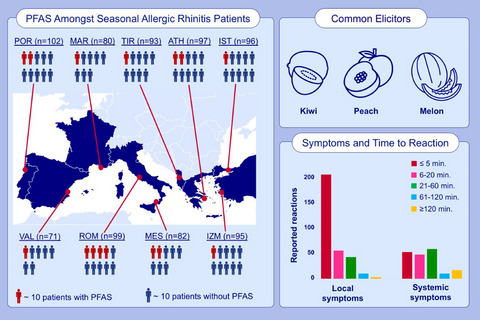Release date:2021-10-29

Allergy
[IF: 13.146]
Heterogeneity of pollen food allergy syndrome in seven Southern European countries: The @IT.2020 multicenter studyDOI: 10.1111/all.14742|
Abstract:
Background: Pollen food allergy syndrome (PFAS) is a frequently underdiagnosed disease due to diverse triggers, clinical presentations, and test results. This is especially relevant in geographic areas with a broad spectrum of pollen sensitization, such as Southern Europe.
Methods: As part of the @IT.2020 Multicenter Study, 815 patients with seasonal allergic rhinitis (SAR), aged 10–60 years, were recruited in seven countries. They completed questionnaires regarding SAR, comorbidities, family history, and PFAS, and underwent skin prick testing (SPT) and serum IgE testing.
Results: Of the 815 patients, 167 (20.5%) reported PFAS reactions. Most commonly, eliciting foods were kiwi (58, 34.7%), peach (43, 25.7%), and melon (26, 15.6%). Reported reactions were mostly local (216/319, 67.7%), occurring within 5 min of contact with elicitors (209/319, 65.5%). Associated characteristics included positive IgE to at least one panallergen (profilin, PR-10, or nsLTP) (p = 0.007), maternal PFAS (OR: 3.716, p = 0.026), and asthma (OR: 1.752, p = 0.073). Between centers, heterogeneity in prevalence (Marseille: 7.5% vs. Rome: 41.4%, p < 0.001) and of clinical characteristics was apparent. Cypress played a limited role, with only 1/22 SPT mono-sensitized patients reporting a food reaction (p < 0.073).
Conclusion: PFAS is a frequent comorbidity in Southern European SAR patients. Significant heterogeneity of clinical characteristics in PFAS patients among the centers was observed and may be related to the different pollen sensitization patterns in each geographic area. IgE to panallergen(s), maternal PFAS, and asthma could be PFAS-associated characteristics.
First Author:
Lipp T
Correspondence:
Paolo M. Matricardi Dept. of Paediatric Pneumology, Immunology and Critical Care Charitè Medical University Augustenburgerplatz, 1
2021-10-08 Article
 杭州浙大迪迅生物基因工程有限公司
杭州浙大迪迅生物基因工程有限公司
